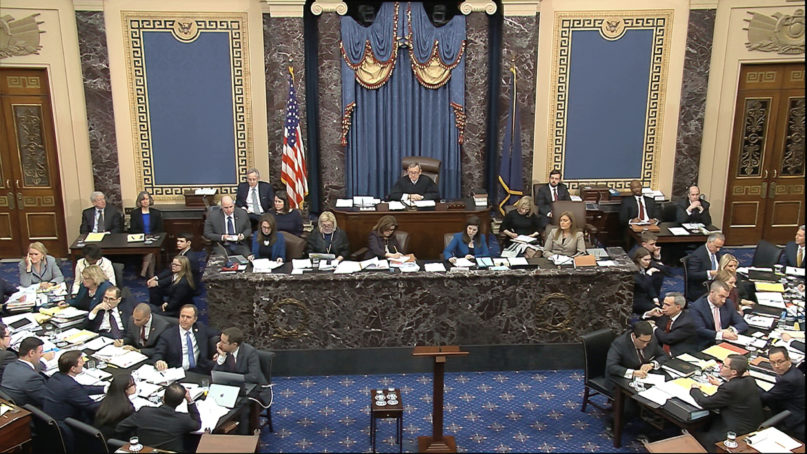(RNS) — Whatever else the impeachment of a president is, it’s an exercise in constitutional faith. Senators and members of Congress, legal scholars and media pundits exegete the relevant words from Articles I and II, invoke the utterances of the framers and make their professions.
Of the latter, the most famous is by Congresswoman Barbara Jordan, D-Tex., pronounced as a member of the House Judiciary Committee just before it passed articles of impeachment for obstruction of justice, abuse of power and contempt of Congress against President Richard Nixon in July of 1974.
“My faith in the Constitution is whole,” Jordan said. “It is complete. It is total. I am not going to sit here and be an idle spectator to the diminution, the subversion, the destruction of the Constitution.”
By that time, release of the White House tapes had effectively established that Nixon had engaged in the coverup of a crime against his political opponents. He resigned rather than face certain impeachment by the whole House and likely conviction in the Senate.
The situation was much less clear during the impeachment of President Clinton. Clinton had fallen into a perjury trap and lied under oath about consensual sexual contact with a White House intern. There was deep partisan disagreement about whether that constituted a high crime or misdemeanor.
“If it were to be asked,” declared House Manager Steven Buyer, R-Ind., “‘What is the most sacred duty and the greatest source of security in a Republic?’ the answer would be, an inviolable respect for the Constitution and Laws.” By Republican standards, Clinton had disrespected both and needed to be thrust from office. Pleading for enough senators’ votes to convict, House Judiciary Chairman Henry Hyde, R-Ill., expressed the hope that in 100 years “people will look back at what we’ve done and say, ‘they kept the faith.'”
In disagreement, the president’s Democratic defenders testified to their own constitutional faith.
Congresswoman Sheila Jackson Lee, R-Tex., a member of the House Judiciary Committee, told her hometown paper that impeaching the president for lying about sex would trample the Constitution, that “sacred document.” And in his virtuoso summation of the president’s case before the Senate, the recently retired Senator Dale Bumpers, D-Ark., announced that he had not come to defend Bill Clinton the man but rather: “It is the weight of history on all of us, and it is my reverence for that great document — you have heard me rail about it for 24 years — that we call our Constitution, the most sacred document to me next to the Holy Bible.”
When it came to doing his job as chief executive, the behavior for which Clinton was impeached was inconsequential. To the extent that his accusers actually believed that it merited impeachment, it was on the grounds that lying — about anything — under oath was, per se, an unforgivable high crime.
This time around, there has been a significant shift in professions of constitutional faith. Instead of acclaiming the Constitution itself as a sacred document, antagonists on both sides have shifted to talking about the constitutional oath as the sacred thing.
Back in October, Rep. Scott Perry, R-Pa., accused “leftists in Congress” of “using their sacred oath to the Constitution as justification to flout the primacy of its principles.” Likewise, Adam Schiff, D-Ca., repeatedly spoke of President Trump’s betrayal of his “sacred oath.”
What’s going on here?
Consciously or not, Democrats and Republicans alike no longer seem to hold the Constitution to be as textually sacred as they used to. Among the former, complaints about the Electoral College, for example, have grown in intensity in recent years. As for the latter, their attraction to the theory of an all but all-powerful “unitary executive” is profoundly at odds with the framers’ commitment to constitutional checks and balances.
During the present impeachment trial, moreover, it has been hard not to consider the arguments of Trump’s defenders as anything other than expressing an unhappiness with the Constitution’s impeachment provisions. Against the near-universal consensus of constitutional scholars (not to mention the Nixon articles), they have contended that impeachment for abuse of power is not allowed, and even that a president cannot be impeached if he merely believes that an act is in the public interest.
“How can you look at this and say the Republican Party isn’t breaking our constitutional design and creating a massive zone of presidential corruption?” tweeted political commentator Ezra Klein.
In announcing that he would vote against the production of witnesses and documents, retiring Senator Lamar Alexander, R-Tenn., granted that the House managers had proved their case that Trump had withheld aid to Ukraine in order to pressure Ukrainian officials to open an investigation into presidential rival Joe Biden but insisted that this was merely an unimpeachable “inappropriate” act.
At the very least, GOP senators have, to paraphrase the late Sen. Daniel Patrick Moynihan, defined constitutional deviancy down.
In the 1988 book that gave constitutional faith its name, law professor Sanford Levinson argued that this faith was central to American civil religion, and that while at times verging on idolatry, it played a critical role in enabling citizens to wrestle with the meaning of the country. A decade ago, Levinson republished the book with an afterword renouncing constitutional faith and calling for a new constitutional convention.
It looks like the two major parties may be prepared, if not to go that far, at least to admit that their faith in our founding document is no longer, as it was for Barbara Jordan, whole and complete.






